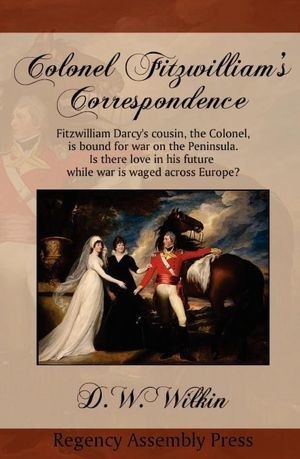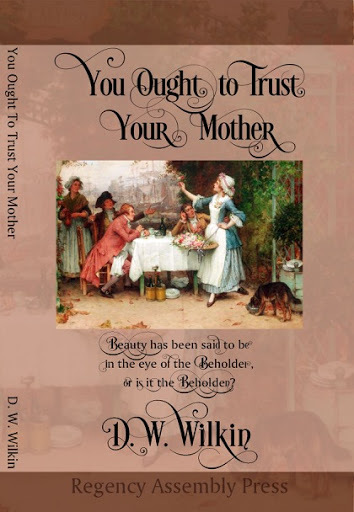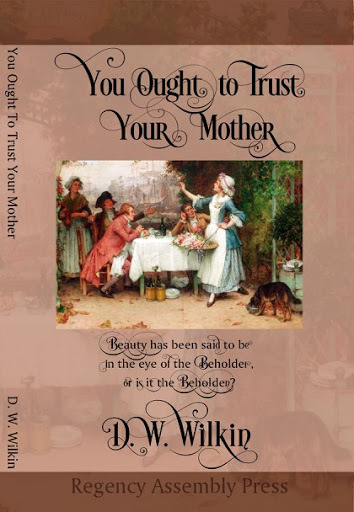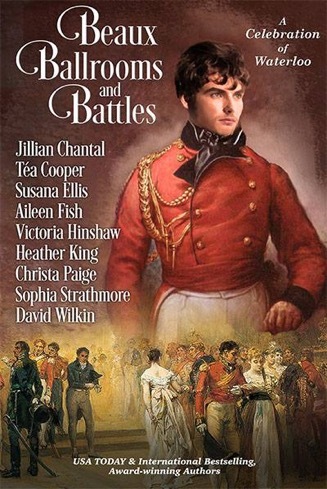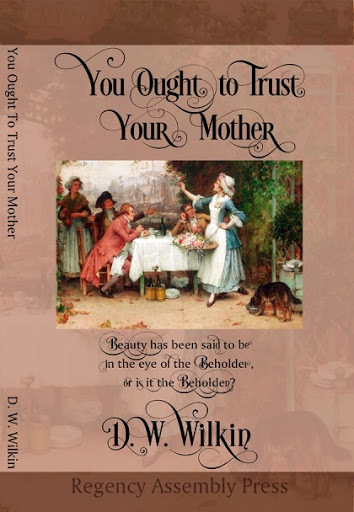D.W. Wilkin's Blog, page 55
May 9, 2016
A Jane Austen Sequel: Colonel Fitzwilliam’s Correspondence
Colonel Fitzwilliam’s Correspondence For your enjoyment, one of the Regency Romances I published.
It is available for sale and I hope that you will take the opportunity to order your copy.
For yourself or as a gift. It is now available in a variety of formats.
For just a few dollars this Regency Romance can be yours for your eReaders or physically in Trade Paperback.
Visit the dedicated Website
Barnes and Noble for your Nook or in Paperback
Amazon for your Kindle or in Trade Paperback
Witnessing his cousin marry for love and not money, as he felt destined to do, Colonel Fitzwilliam refused to himself to be jealous. He did not expect his acquaintance with the Bennet Clan to change that.
Catherine Bennet, often called Kitty, had not given a great deal of thought to how her life might change with her sisters Elizabeth and Jane becoming wed to rich and connected men. Certainly meeting Darcy’s handsome cousin, a Colonel, did not affect her.
But one had to admit that the connections of the Bingleys and Darcys were quite advantageous. All sorts of men desired introductions now that she had such wealthy new brothers.
Kitty knew that Lydia may have thought herself fortunate when she had married Wickham, the first Bennet daughter to wed. Kitty, though, knew that true fortune had come to her. She just wasn’t sure how best to apply herself.
Feedback
If you have any commentary, thoughts, ideas about the book (especially if you buy it, read it and like it
You Ought to Trust Your Mother (YOTTYM) now released
Now available the next Regency Romance tale by D.W. Wilkin:
Beauty has been said to be in the eye of the Beholder, or is it the Beholden.
The tale of Baron Fallion Lancelot Stafford, a gentleman of perhaps too much leisure who has served in the wars of some few years before. He now has decided that all this leisure is perhaps a waste and he should be doing something. He was just very unsure what that was.
We also find Lady Beatrice Cavendish, the daughter of the Earl of Hoare who is famed for her beauty, yet cannot find any man who has more to speak to her beyond that one subject. And yet far too many think they should offer for her with only the ardent praise to her looks to recommend them. Perhaps there exists one suitor who could speak on a subject beyond that?
In the rush of the Season of 1821, where their most intimate friends have all come to the conclusion that they should marry, can Beatrice put aside her willful ways and hear sound thoughts that her mama has said on that particular subject? Beatrice was sure that her mother would be content if she accepted the Baron Tweedglen, or any of a dozen other men of good breeding, position, or wealth. Whether they had ought to speak on her attractiveness, and no other words would leave their mouths.
Certainly a marriage with such foundations was doomed to crumble once age advanced and liver spots or wrinkles appeared. Yet amongst the Ton, such marriages were often deemed successes. Would they be so for Beatrice, though. That was something she was destined to apply her won thoughts to.
Now available on Amazon for $15.99…
also available for your Kindle and Kindle Reading Apps for $3.99


May 8, 2016
You Ought to Trust Your Mother (YOTTYM) now released
Now available the next Regency Romance tale by D.W. Wilkin:
Beauty has been said to be in the eye of the Beholder, or is it the Beholden.
The tale of Baron Fallion Lancelot Stafford, a gentleman of perhaps too much leisure who has served in the wars of some few years before. He now has decided that all this leisure is perhaps a waste and he should be doing something. He was just very unsure what that was.
We also find Lady Beatrice Cavendish, the daughter of the Earl of Hoare who is famed for her beauty, yet cannot find any man who has more to speak to her beyond that one subject. And yet far too many think they should offer for her with only the ardent praise to her looks to recommend them. Perhaps there exists one suitor who could speak on a subject beyond that?
In the rush of the Season of 1821, where their most intimate friends have all come to the conclusion that they should marry, can Beatrice put aside her willful ways and hear sound thoughts that her mama has said on that particular subject? Beatrice was sure that her mother would be content if she accepted the Baron Tweedglen, or any of a dozen other men of good breeding, position, or wealth. Whether they had ought to speak on her attractiveness, and no other words would leave their mouths.
Certainly a marriage with such foundations was doomed to crumble once age advanced and liver spots or wrinkles appeared. Yet amongst the Ton, such marriages were often deemed successes. Would they be so for Beatrice, though. That was something she was destined to apply her won thoughts to.
Now available on Amazon for $15.99…
also available for your Kindle and Kindle Reading Apps for $3.99


Regency Personalities Series-Sir William Drummond of Logiealmond
Regency Personalities Series
In my attempts to provide us with the details of the Regency, today I continue with one of the many period notables.
Sir William James Charles Maria Drummond of Logiealmond
1770 – 1828
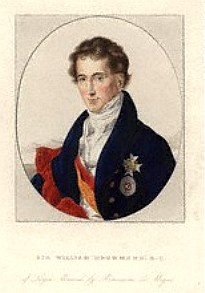
William James Charles Maria Drummond
Sir William Drummond of Logiealmond was born in Perthshire the son of John Drummond of Perth. He was educated at Oxford University.
In 1798 he was elected a Fellow of the Royal Society of Edinburgh, his proposers being Dugald Stewart, Alexander Keith and John Playfair. He was elected a Fellow of the Royal Society of London the following year.
He lived in London from 1809 and died in Rome in Italy on 29 March 1828.
In 1795 he was MP for St. Mawes, and in the elections of 1796 and 1801 was returned for Lostwithiel. He was elected a fellow of the Royal Society in 1799 These were both rotten boroughs in Cornwall. He became sworn as a Privy Counsellor in 1801, and left Parliament as a diplomat, as Envoy to the court of Naples. In 1803 he became British Ambassador to the Ottoman Empire. Appointed by the Levant Company on 14 January 1803, he arrived at the Dardanelles the following May. He was there for less than a year and then he returned to England in 1804. From 1806 to 1809 he served as Envoy to the Court of Naples for a second time.
He was knighted in 1813 or 1814.
The title of Drummond’s book refers to the later Platonic Academy, which was, in fact, not so much Platonist as Sceptical in orientation, based on the work of Pyrrho the Sceptic and later followers of Pyrrho such as Carneades. Academical Questions is a work in the Sceptic tradition, in this case influenced by the Sceptical Scottish philosopher David Hume.
According to C. E. Pulos’s 1954 book The Deep Truth: A Study of Shelley’s Scepticism, Drummond uses Sceptical Humean ideas in an attempt to refute the British philosophy predominant in his day, the Common Sense ideas of Thomas Reid and his followers. These had been enunciated first in Reid’s An Enquiry into the Human Mind (1765).
Drummond failed to unseat Reid’s ideas in popularity; they remained dominant in English philosophy for the first half of the 19th century.
In contrast to other scholars he names, Pulos argues that Shelley was decisively influenced by Academical Questions, and under its influence confidently abandoned 18th-century French materialism. According to Pulos, Drummond altered the poet Shelley’s beliefs. He ceased being an 18th-century French materialist; Shelley asserted that some passions (of the heart) are “innate.”
His Oedipus Judaicus references the Oedipus Aegyptiacus of Athanasius Kircher, and was printed for private circulation. It was reprinted in 1866, having proved highly controversial (introduction to 1986 reprint by James P. Carley). It interprets passages from the Book of Genesis (in particular the Chedorlaomer story), and the Book of Joshua, in allegorical fashion, with a detailed argument based on astrology.
A Review of the Government of Sparta and Athens (1794)
Academical Questions (1805)
Herculanensia (1810) with Robert Walpole
Oedipus Judaicus (1811, privately circulated and reprinted in 1866)
Odin (1818), poem
Origines, or Remarks on the Origin of several Empires, States, and Cities (1824–29)


RAP (Regency Assembly Press) in need of Beta-Readers
Regency Assembly
Press
is looking for
Beta Readers
One novel is ready for Beta Reading
We have a continuation of Pride and Prejudice with Ms Caroline Bingley and her fortune at stake:
Do we think that Mr Hurst married his Bingley Bride without incentive? It is highly probable that Caroline Bingley, even though she has a sharp, acerbic tongue, still is in possession of a fortune and an astute fortune hunter who deciphers this may soon be on the road to, if not a happy marriage, one with financial security.
Please respond or send an email if you are interested


Beaux, Ballrooms, and Battles
A new Regency Anthology
Beaux, Ballrooms, and Battles anthology, celebrating the 200th anniversary of the victory at Waterloo in story.
Looks good, huh? The talented writer and digital artist, Aileen Fish created this.
It will be available digitally for $.99 and then after a short period of time sell for the regular price of $4.99
The Trade Paperback version will sell for $12.99
Click on the Amazon Link—>Amazon US

My story in the anthology is entitled: Not a Close Run Thing at All, which of course is a play on the famous misquote attributed to Arthur Wellesley, “a damn close-run thing” which really was “It has been a damned nice thing — the nearest run thing you ever saw in your life.”
Samantha, Lady Worcester had thought love was over for her, much like the war should have been. The Bastille had fallen shortly after she had been born. Her entire life the French and their Revolution had affected her and all whom she knew. Even to having determined who she married, though her husband now had been dead and buried these eight years.
Yet now Robert Barnes, a major-general in command of one of Wellington’s brigades, had appeared before her, years since he had been forgotten and dismissed. The man she had once loved, but because he had only been a captain with no fortune, her father had shown him the door.
With a battle at hand, she could not let down the defenses that surrounded her heart. Could she?
As her father’s hostess, she had travelled with him to Brussels where he served with the British delegation. Duty had taken her that night to the Duchess of Richmond’s ball. The last man she ever expected to see was Robert, who as a young captain of few prospects, had offered for her, only to be turned out by her father so that she could make an alliance with a much older, and better positioned (wealthy), aristocrat.Now, their forces were sure to engage Napoleon and the resurgent Grande Armée. Meeting Robert again just before he was to be pulled into such a horrific maelstrom surely was Fate’s cruelest trick ever. A fate her heart could not possibly withstand.
Here are the first few paragraphs to entice you:
Chapter One
“Come father, we shall be dreadfully late. Already the other guests of the inn have all departed for the ball.” Samantha distinctly heard him grunt. Her father did not like balls.
“You will not fault me if I stay to the card room with the other old gentlemen. We always have much to discuss,” he said. Her father served with the delegation led by Sir Charles Stuart.
In a moment he would complain about the pains caused by his gout. Always handy when social obligations were required and never present when he had his ‘important’ work to do.
“Father, are you sure that there is going to be a battle? I just can’t believe that Her Grace of Richmond is hosting a ball when the soldiers will be going off to fight.” Lady Worcester, who had been once just The Honourable Samantha Villiers, asked of her father, the second Viscount Haddington.
She had married the Earl of Worcester twelve years before, a man who had died before the Peace of Amiens had been shattered. They had no children, and as there were only distant heirs, the property went to those relations whilst the title became extinct. Samantha was the last Lady Worcester.
“The fighting is close at hand, but I have every confidence in the Duke of Wellington. Marvellous man. The French will be quite surprised when he takes this army and invades their lands,” her father said. “I am afraid I shall not be able to stand up and offer one dance with you, my good girl. The pains in my foot are troubling me.”
As Samantha had predicted.
That was always the excuse. Samantha was assured that her father had not once stood up to dance since her mother had died.
Over the many years she had had to study her father, for she had taken to being the hostess of his household upon the death of her husband, her mother having died before her own marriage, she had noted that her father was more impressed by title, position, and wealth, than by capabilities.
However, her own study of Wellesley, now the Duke, paralleled her father’s assessment at least when it came to Wellington’s successes as a commander. Yet the Duke had never faced Napoleon. Until only the most recent years, the Emperor of France had seldom lost any engagement. The Duke of Wellington had faced Napoleon’s lieutenants, and captains, but never the very best commanders of Le Grande Armée.
“It is understandable, Father, with your foot being troublesome, that you wish to proceed to the card room. You should enjoy this night. It will all be over too soon, and as you say, the engagement is imminent. Many here this evening we may never know again.” More than twenty years of war and she had known the loss of several military men.
Her father nodded. He had trained her to recognize the truth regarding these years of war. It was why he had been so against a liaison with Robert Barnes when she had first come out. Her other ardent suitor during her Season in ’03.
A time long ago.
Samantha and the Viscount were in the foyer of their lodgings. All the best places had been taken by those of great rank and wealth. This was a small inn that six other families shared.
She and her father were ready to leave for the ball, their hired carriage at the front of the building even then. Samantha had looked from the window and seen their coachman, Phillipe, waiting patiently.
He was paid for from her Worcester monies. The two years that Samantha had not lived with her father whilst married, had resulted in his losing near all the Haddington monies. He had retained very little of the capital, none of grandfather’s lands, and survived on monies advanced by the government to see to his office as well as what monies Lady Worcester was able to provide to the expenses of his household. Expenses that she managed with prudence.
Shaking her head and exiling the thought away, she pondered on a ball in a coach house. How novel to attend.
She had called on the Duchess several times, as they knew each other socially. Samantha well knew many of the women that had formed society here in Brussels. Her father’s stature with the delegation caused her to be a hostess to much smaller events than the ball.
With the assured defeat of Napoleon the war would end and her father’s service would be over. So also would the service of that other man who had asked for her before.
Robert had gone back to fight once war broke out again when the Peace of Amiens fell apart. She had since lost track of him.
Samantha had forced herself to lose track of him.


May 7, 2016
Trade Paperback of YOTTYM now available
Now out in print, the next Regency Romance tale by D.W. Wilkin:
You Ought to Trust Your Mother
Beauty has said to be in the eye of the Beholder, or is the Beholden.
The tale of Baron Fallion Lancelot Stafford, a gentleman of perhaps too much leisure who has served in the wars of some few years before. He now has decided that all this leisure is perhaps a waste and he should be doing something. He was just very unsure what that was.
We also find Lady Beatrice Cavendish, the daughter of the Earl of Hoare who is famed for her beauty, yet cannot find any man who has more to speak to her beyond that one subject. And yet far too many think they should offer for her with only the ardent praise to her looks to recommend them. Perhaps there exists one suitor who could speak on a subject beyond that?
In the rush of a Season where their most intimate friends have all come to the conclusion that they should marry, can Beatrice put aside her willful ways and hear sound thoughts that her mama has said?
Now available on Amazon for $15.99… Additional formats, such as Kindle, iBooks, to follow over the course of the weekend. (It seems the formatting Table of Contents for Digital books gets harder and harder as the years progress…)


Releasing this weekend
Coming most likely this week the next Regency Romance tale by D.W. Wilkin:
You Ought to Trust Your Mother
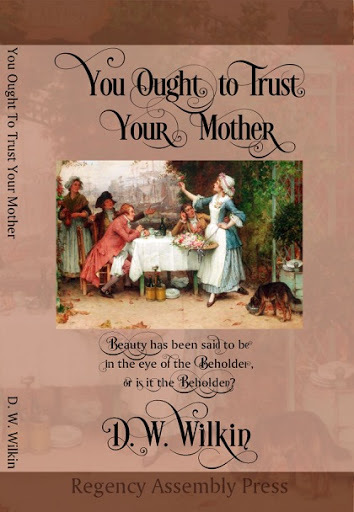
Beauty has said to be in the eye of the Beholder, or is the Beholden.
The tale of Baron Fallion Lancelot Stafford, a gentleman of perhaps too much leisure who has served in the wars of some few years before. He now has decided that all this leisure is perhaps a waste and he should be doing something. He was just very unsure what that was.
We also find Lady Beatrice Cavendish, the daughter of the Earl of Hoare who is famed for her beauty, yet cannot find any man who has more to speak to her beyond that one subject. And yet far too many think they should offer for her with only the ardent praise to her looks to recommend them. Perhaps there exists one suitor who could speak on a subject beyond that?
In the rush of a Season where their most intimate friends have all come to the conclusion that they should marry, can Beatrice put aside her willful ways and hear sound thoughts that her mama has said?


Regency Personalities Series-Francis Charteris Lord Elcho
Regency Personalities Series
In my attempts to provide us with the details of the Regency, today I continue with one of the many period notables.
Francis Charteris Lord Elcho
31 January 1749 – 20 January 1808
Francis Charteris was the only son of the Honourable Francis Charteris, second son of James Wemyss, 5th Earl of Wemyss. The fifth Earl’s eldest son David Wemyss, Lord Elcho had been attainted for his part in the Jacobite Rising of 1745 so after the Earl’s death in 1756 the earldom became forfeit.
Charteris was elected to Parliament for the Haddington district of burghs in 1780. From 1784 he was in opposition to the government of William Pitt the Younger.
In 1787 Charteris’ uncle Lord Elcho (who but for his attainder would have been 6th Earl of Wemyss) died. As Charteris’ father had not been attainted himself, he assumed the title as 7th Earl of Wemyss, with Charteris assuming the title Lord Elcho. At the time eldest sons of Scottish peers were not allowed to represent Scottish constituencies in Parliament, and after a debate on the matter Charteris had to vacate his seat. Although it was later established that the Earldom of Wemyss remained forfeit and his father was not after all a Scottish peer, Charteris did not attempt to re-enter Parliament.
Charteris died on 20 January 1808 at Amisfield House, East Lothian, and was interred at St Mary’s Collegiate Church, Haddington.
Francis Charteris married in 1771 Susan, daughter of Anthony Keck and granddaughter of James Hamilton, 4th Duke of Hamilton. They had one son and four daughters:
Francis, who obtained a reversal of the attainder and became 8th Earl of Wemyss
Henrietta Charlotte Elizabeth, who married George Harry Grey, 6th Earl of Stamford
Susan, who married Sir Henry Clinton
Katharine, who married Edward Richard Stewart
Augusta, who married Warner William Westenra, 2nd Baron Rossmore.
In 1818—after Francis Chateris’s death—his widow Susan Chateris (by then the Dowager Lady Elcho) changed her surname to Tracy as a condition of inheriting her uncle Robert Tracy’s estate, on the death of her elder sister.


1st book in the Masqueraders Chocolate House series
I and five others have released the first in what could turn out to be a few, an anthology centered around Bath of the Georgian and Regency period. All proceeds go to charity, specifically the Great Ormond Street Hospital.
The Chocolate House
All For Love
[image error]
Our Authors are noted and award winning storytellers in the genre of Georgian and Regency era Historical Novels:
David W Wilkin
Francine Howarth
Giselle Marks
Jessica Schira
Susan Ruth
Elizabeth Bailey
A Sensual blend of Chocolate, Romance, Murder & Mystery at “Masqueraders”.
The beautiful City of Bath, famous for its Roman Spa, its Abbey, its Pump Room & Assembly Rooms, and Sally Lunn’s bun shop, is a place made famous within the literary world by the likes of Jane Austen, Georgette Heyer, and other authors of Georgian and Regency historical novels. Thus Bath is renowned as a place for intrigue and romance, but few readers will have stepped across the threshold of Masqueraders’, a notorious and fashionable Chocolate House, that existed within the city from 1700 to the latter part of the reign of William IV. What happened to it thereafter, no one knows, for sure. Nor does anyone know why Sally Lunn’s bun shop disappeared for decades until it was rediscovered.
So it could be said, essence of chocolate drifting on the ether denotes where the seemingly mystical Masqueraders’ once existed, and it is that spiritual essence that has brought authors together from around the globe, to pen a delightful collection of Georgian & Regency romances, that are, all, in some way, linked to The Chocolate House. We sincerely hope you will enjoy the individual stories, and be assured all the royalties earned will be donated to Great Ormond Street Hospital for Children, London.
The stories:
A Rose by Any Other – Giselle Marks.
A Fatal Connection – Elizabeth Bailey
The Runaway Duchess – Francine Howarth
Death at the Chocolate House – Susan Ruth
A-Pig-in-a-Poke – Jessica Schira
A Little Chocolate in the Morning – David W. Wilkin.
My story (As the author and owner of this Blog, I feel I can tell you more) is the story of Charles Watkins the Marquis of Rockford (for those who want the nitty gritty, ask and we can discuss the very specific creation of name details that went into this) who has recently come into his title and estates, his father dying just about a year before. Now he is to return to London after his mourning is over to use his seat in the House of Lords in aid of the war against Napoleon. He is not in Town to seek a bride though the dowager Marchioness should like that he attain one.
No, certainly not the schoolmate of his younger sister Emma, Lady Caroline Williamson, the daughter of the Earl of Feversham. A girl as young and silly as his sister, he would never wed, and certainly not fall in love with. But rescuing her from the clutches of a man who was old enough to be his own grandfather, that he could do with ease, and perhaps Panache.
Available at Amazon Digitally for your Kindle for $2.99 or Physically in Trade Paperback



